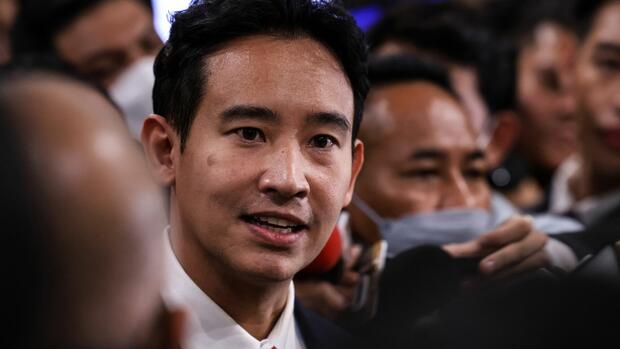Bangkok Thailand is slipping into a new political crisis: In a vote on Thursday, the pro-democracy coalition around election winner Pita Limjaroenrat failed in its attempt to replace the military-backed government.
The eight-party alliance had achieved a clear majority in the House of Representatives in the parliamentary elections in May. But the Senate, appointed by the former military government, blocked Pita’s appointment as the next prime minister.
After the decision, the formation of a government is a long way off. A wave of protests is now expected from Pita’s supporters who feel cheated of their election victory. Southeast Asia’s second largest economy is thus facing a new phase of political instability, which is also likely to hit the country’s economy hard.
Pita and his Move Forward party surprisingly won the parliamentary elections in May with the promise of extensive reforms. The result revealed a widespread mood of change in the country, whose politics have been dominated by former army chief Prayut Chan-ocha and his allies since the 2014 military coup.
Under the generals, Thailand’s economy fared significantly worse than other emerging economies in the region. Pita promised higher wages and stronger competition to break the massive market power of a few large corporations.
Reform plans for the monarchy in Thailand are met with resistance
The fierce resistance that the 42-year-old former start-up manager has been facing for weeks is mainly due to his reform plans with a view to the military and the influential monarchy. He wants the soldiers to stay out of Thailand’s politics in the future and wants to relax the strict lèse-majesté law, under which activists are regularly sentenced to prison.
Many in the Thai population support political change.
(Photo: AP)
His opponents see this as an attack on the constitutional monarchy – and are therefore taking legal action against Pita and his party. Several of the senators close to the military cited the monarchy plans as a key reason for their rejection of Pita on Thursday.
However, given the majority situation, there is currently no clear alternative to Pita and his coalition in sight. Two months after the election, it remains completely unclear who will govern the country in the future.
Business officials had warned of such a situation ahead of the parliamentary vote: “The delay in forming a government may affect the confidence of new investors planning to enter the market,” said Poj Aramwattananont, a senior official at the Thai Chamber of Commerce. After all, investments can hardly be planned if the future political framework is completely open.
Concerns about the impact of protests on the economy
Businesses are also concerned about the possible economic fallout from street protests, which are now expected in response to the blockade by the pro-democracy governing coalition. “Should they turn violent, it will certainly affect the number of foreign visitors,” said Sanga Ruangwattanakul, president of a local tourism association in Bangkok.
>> Read here: The climate crisis threatens Asia’s economic rise
For decades there have been conflicts, some of them serious, between opposing political camps in Bangkok. Most recently, the Thai capital saw clashes between demonstrators and state forces during mass protests in 2020.
Tourism is an important industry in Thailand.
(Photo: Bloomberg/Getty Images)
Another slump in the tourism business would be a hard blow for the holiday destination. Thailand is only slowly recovering from the complete collapse of the tourism industry during the corona pandemic. For this year, the government expects 25 million visitors – before the pandemic there were more than 40 million.
>> Read here: How tourists in Asia are being used against China’s quest for power
The head of the University of the Thai Chamber of Commerce, Thanawat Pholvichai, also warned of a noticeable slowdown in the economy if the formation of a government was still several months away.
By October at the latest, this would cause problems with public spending. The caretaker government of ex-army chief Prayut, which will remain in office until a new prime minister is elected, no longer has a majority to pass a new budget.
It is currently not foreseeable that the stalemate in Bangkok will resolve itself quickly. In the coming week, Pita wants to make another attempt in a new round of elections to be elected prime minister.
At the moment, however, there is no indication that his opponents will then vote differently. At the same time, several proceedings are pending against Pita, including for alleged violations of the electoral law. The constitutional court could therefore disqualify him.
More: Power struggle in Thailand – A former start-up exec opposes the conservative establishment
